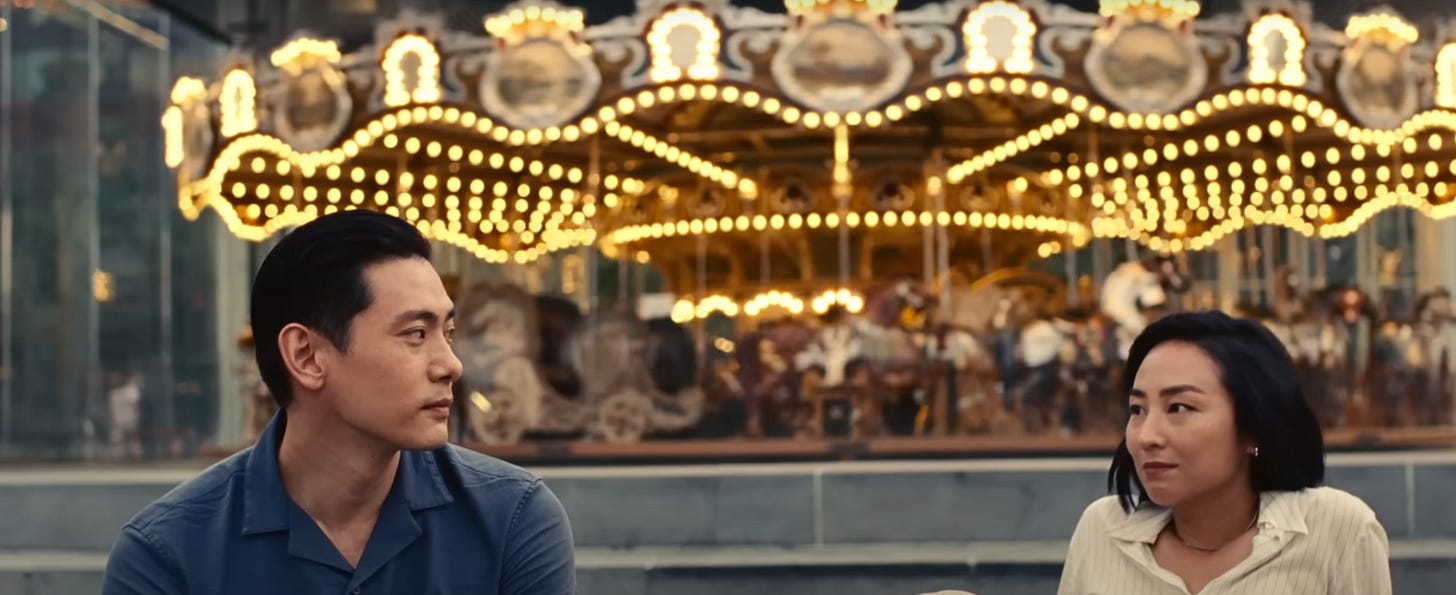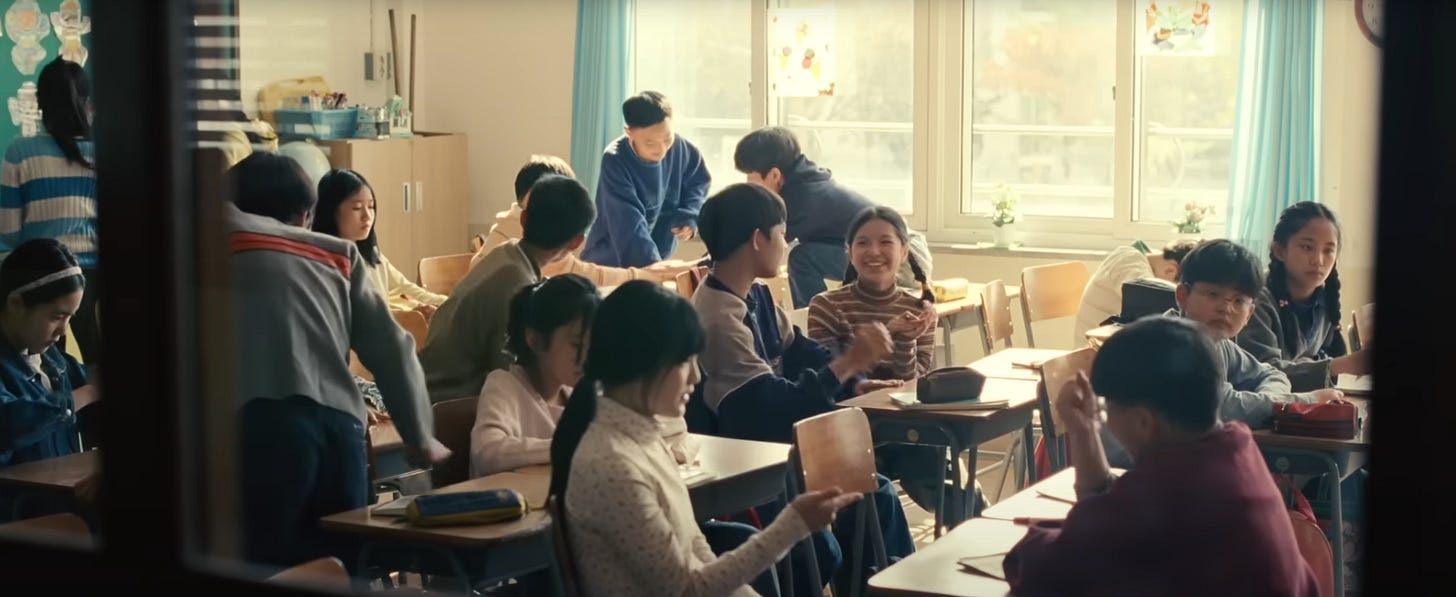“Are we condemned to be free?”
- Jean-Paul Sartre
Past Lives is one of those hazy films that lingers on the mind like a half-remembered dream.
It ponders “what-ifs” and “what-could-have-beens” through the lens of two childhood friends, Nora and Haesung, whose lives diverge when Nora immigrates from Korea to Canada. Under the unassuming invitation of a love story, it meditates on time, fate, and the people who shape us.
Some present-tense questions that Past Lives left with me. And a soundtrack for your reading:
1. Do we stop being the people we once were?
When Nora and Haesung reunite after decades, the past rushes back in. There is this unexplainable synchronicity between people. It is proof that who we were, and who we are, share inextricable origin. This feels especially true of childhood.
The shape of life may change. But the bonds that hum beneath the surface, to the places we were, the people we were with, those are written in permanent ink. Notes in the margins of the book of our being, living quietly in the spaces between the words and the years.
The weight of who we are, and who we’re becoming all the time. The past lingers in nostalgia, but also the present-tense fabric of who we are. Can we ever fully separate from our origins? Or do they continue to live within us, even as we evolve?
“I left Korea, but that doesn’t mean Korea left me.”
- Nora
2. Is love ever lost or does it change shape?
There are two questions here, really: (i) from person to person, or from time to time, and (ii) over time with the same person?
(i) From person to person, or from time to time. The search for love and the search for self feel intertwined. The forms that this search takes (in person, or in time) are secondary to the process itself, of losing love and rediscovering it. The depth that comes from destroying something gives the next love a chance of succeeding.
Sasha Chapin writes beautifully to an unidentified someone: “Our relationship taught me what it’s like to destroy something beautiful for absolutely no reason, and there is a bleak majesty to that.” There is implicit connectivity from that, to all love that follows.
(ii) Over time with the same person. As we spend life with someone, we unlock levels of love that existed all this time but were unrealized until we deserved them. It’s through the shared crossing of the liminal chasm of what can be that we become deserving.
This can take different literal forms, like long-distance, prolonged hardship, or learning how to argue through really bad fights; but this kind of love built on a foundation of repeated choosing over time, with the same person, renders other forms superficial.
Past Lives is an exploration of the liminal chasm that remains unexplored, and holds within it something outside of time, never gone but never realized.
“In another life, I think I would have really liked being married to you.”
- Haesung
3. How much of our life is fate, and how much is choice?
Throughout the film, there’s a recurring concept called inyeon — the idea that people who cross paths have met in past lives.
Is their reunion destiny or coincidence? Are we following an inevitable script written long ago, or are we the authors? It could be that fate is nothing more than the story we tell ourselves to make peace with our choices.
Providence whispers in coincidences. Inyeon suggests that connections stretch across time, layered through thousands of past encounters. It suggests that maybe we don’t choose people, but recognize them somehow.
But then there’s the feeling of choice — the doors we chose to open, the ones we chose to walk past, the moments we chose one life from another. Are we condemned to be free?
Maybe it’s a dance between what is written and what we write ourselves, turning the pages while inyeon holds the pen.
“If two people have 8,000 layers of inyeon, they are bound to be together.”
- Nora
4. Can we bridge the gap between versions of ourselves?
There’s an amazing scene of Nora and Haesung sitting in Dumbo, silence stretching between them.
He is the embodiment of a perfectly parallel life she could have lived; she is someone he struggles to fully understand, shaped so beyond her predictable life path, growing up in a world an ocean away.
Haesung knows that he and Nora exist in different worlds now, but there is a childlike yearning in him that longs to exist in that shared past. It’s an admission that reality won’t allow.
Can we reconcile the different selves we accumulate over time? Or do we become strangers to those who knew us before we changed?
Always in motion, always in between. The past and present don’t fit together but belong to the same story.
“We were kids together, and then we weren’t.”
- Haesung
5. How do we say goodbye to lives that never happened?
Unexplored possibilities, things left unsaid, captivate us. Every choice we make is a door closed on another version of our lives. Two roads diverged in a yellow wood (Frost). We carry entire alternate futures with us and think about them constantly.
Goodbyes are not just about losing others, but also losing a version of ourselves that will only exist in memory. We are all shaped by the people who pass through our lives, and in leaving them unexplored, we leave behind pieces of ourselves too.
No grand resolution. No perfect goodbye. Just life, moving forward, carrying the weight of possibilities in the rearview.
“When you leave someone behind, you leave a version of yourself behind too.”
– Nora
6. Is closure real?
The film doesn’t offer neat resolutions. Instead, it leaves us with an ache that is both deeply personal and universal. Some stories don’t end; they just continue. Maybe the hardest part isn’t the goodbyes but the way life keeps moving after them.
Time has a cruel way of moving forward without asking permission. Relationships shift through the mere passage of time. The inevitability of change is exciting and heartbreaking: everything is transient.
Some stories never really end. They just become part of us, waiting to be remembered in quiet moments, in familiar faces, in the spaces between then and now. The feeling of recognition lingers for a while but slips away when we try to grasp it.
“I want to stay in the past with you.”
- Haesung
7. Why does this feel so familiar?
The film is the closest thing in real life, that feels like being in a dream. It gives us the space to feel, to sit in the in-between, to recall our own past lives, and to feel sad and happy, while the longing settles deep in our bones.
We’ve all lived a version of Past Lives. We’ve all wondered about roads not taken, strangers not met, lives that were not. That small part of us that is inaccessible to others, even those closest to us.
If past lives shape the present, then maybe the life we’re living right now is also something transient, something that will feel like a past life one day.
Existential, melancholic beauty.
“I think you dream in a language that’s lost to me.”
- Arthur











U need to give urself some more credit bc ur writing is sooo good!! Can’t wait to read through more of ur pieces :)
Section 3 reminds me of Ted Chiang:
“If our lives are tales that Allah tells, then we are the audience as well as players, and it is by living these tales that we receive their lessons.”
Providence whispers in coincidences… man.